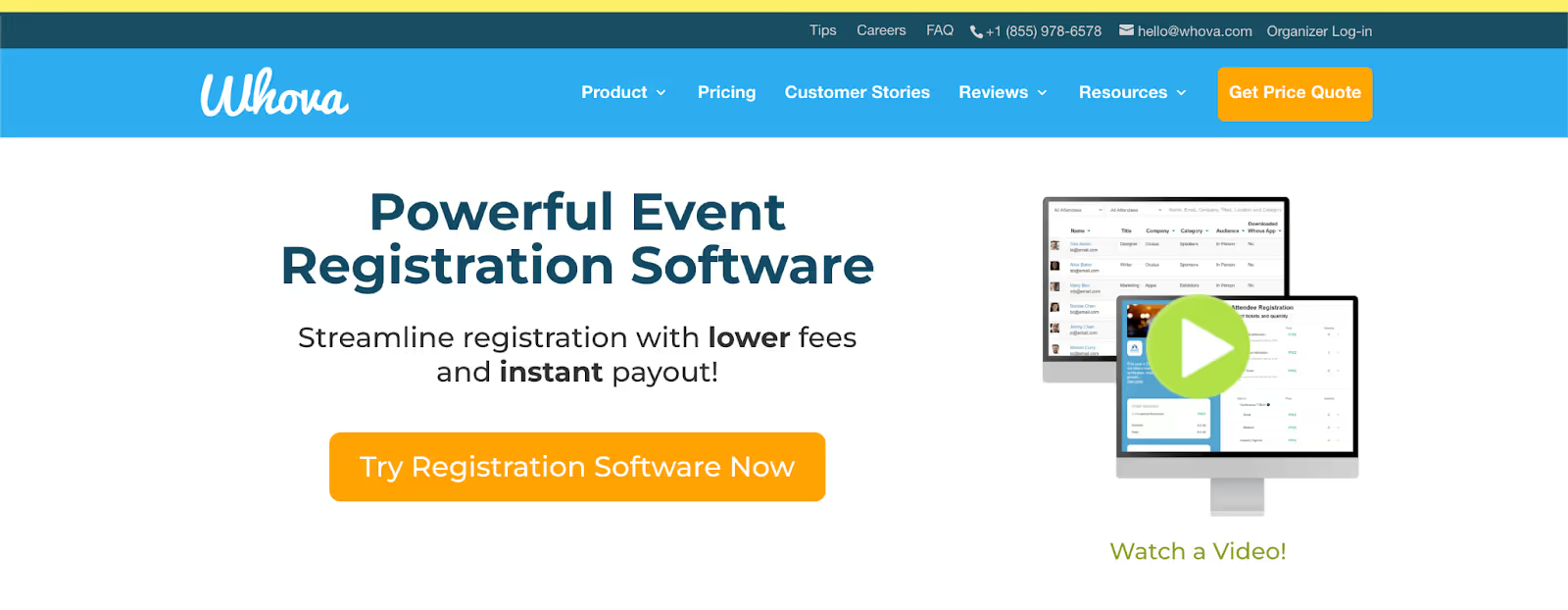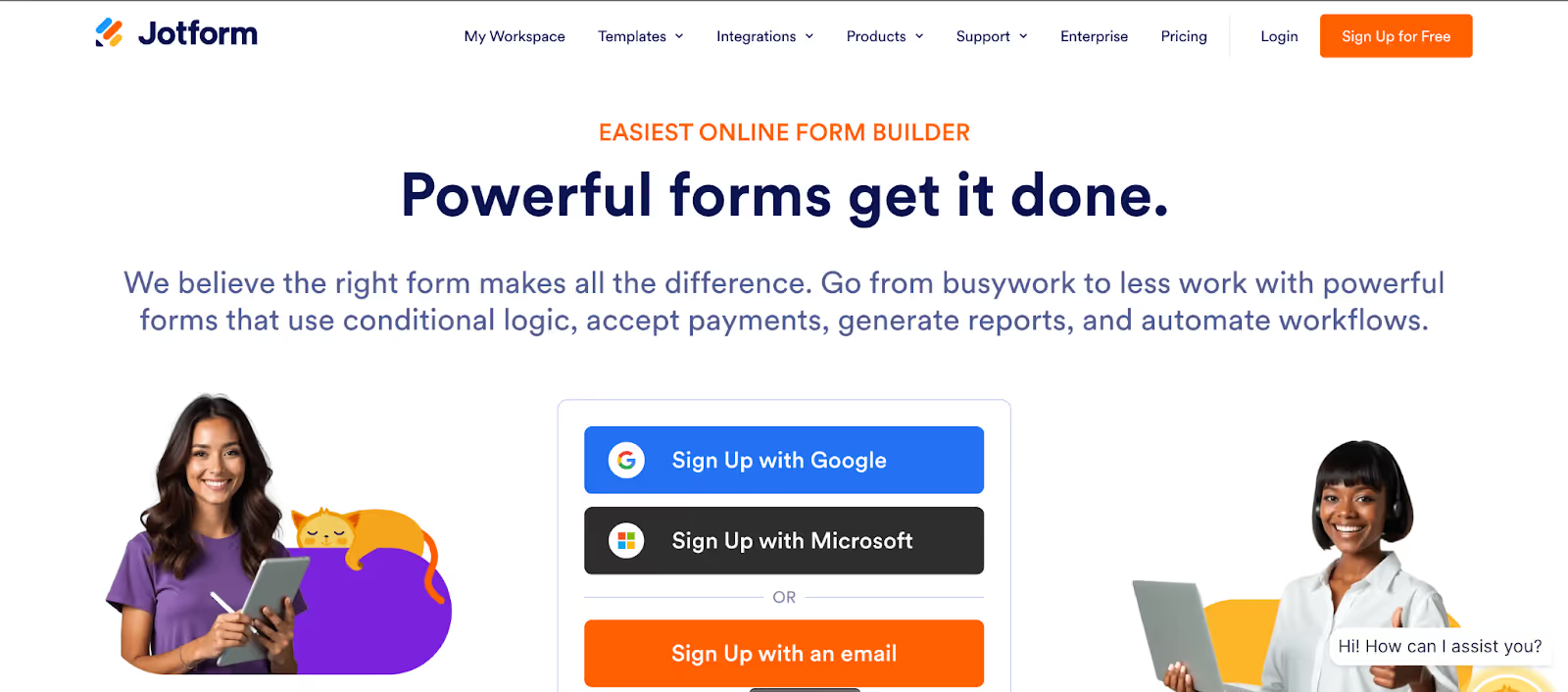Best Event Registration Software Reviews 2025
Explore the top event registration software for 2025. Streamline registration, secure payments, and improve planning. Check out this post and find your perfect fit now!
.avif)
CONTENT
The event technology sphere is witnessing explosive growth, with event registration software at its core. As event organizers seek to deliver increasingly sophisticated and engaging experiences, the demand for robust digital solutions has surged. A recent report indicates that the global event management software market will reach over $14 billion by 2030, highlighting the increasing reliance on digital tools.
Event software is changing how we plan and run events. From simplifying complex registration processes to providing invaluable data-driven insights, these platforms redefine how events are conceived, managed, and experienced.
This guide will review the top event registration software options available, highlighting their key features, benefits, and how they can streamline your event planning process.
The Role of Event Registration Software: Fostering Efficiency and Connection
Adopting digital registration systems delivers many benefits, transforming event management from a logistical challenge to a strategic advantage. Specifically:
- Automated registration processes secure accurate data entry instead of relying on error-prone manual methods, significantly reducing administrative overhead. Consider a large conference where every attendee's information is instantly recorded and organized, eliminating the need for manual data entry.
- These platforms enrich the attendee's journey by providing instant confirmations and personalized information access, creating a seamless interaction. For example, participants can receive tailored event schedules and venue details directly to their mobile devices.
- The ability to gather and analyze attendee data offers invaluable insights, facilitating informed decisions for future events. This might include analyzing session attendance to understand participant interests and tailor future content accordingly.
- Automation of routine tasks frees up valuable resources, allowing event planners to focus on strategic aspects of the event. For instance, online payment systems minimize the need for dedicated staff to handle financial transactions.
Having recognized the significant impact of event registration software, it's crucial to delve into the core functionalities that make these platforms indispensable.
Essential Components of Effective Event Registration Systems:
A robust event registration system is built upon key features designed to optimize the event management process and enhance participant interaction.
1. Tailored Registration Forms:
- The ability to customize registration forms to capture specific attendee information is paramount. This includes the ability to collect, personal information, dietary needs, preferred sessions, and more.
- For instance, a medical conference could use customized fields to gather details about professional affiliations and areas of specialization.
2. Secure Transaction Processing:
- Integration with reliable payment gateways, such as Stripe or PayPal, ensures secure and convenient online financial transactions.
- For example, participants can purchase tickets and event merchandise directly through the registration platform.
3. Real-Time Analytical Insights:
- The capacity to track attendance, ticket sales, and other vital metrics in real time provides valuable data for informed event management.
- For example, event organizers can monitor ticket sales to understand the event's popularity better and adjust marketing as needed.
4. Integrated Data Flow:
- Integrating CRM and marketing platforms facilitates a cohesive data flow, enhancing communication and post-event follow-up.
- For example, connecting with a CRM system allows automated email campaigns to be sent to participants before and after the event.
With a clear understanding of the essential features, we now focus on the critical factors that guide the selection of the right event registration software.
Factors to Consider When Choosing an Event Registration Software
Several critical factors must be considered when evaluating event registration software to ensure the chosen platform aligns with the event's objectives and operational needs.
- An intuitive interface ensures ease of use for organizers and attendees, minimizing the learning curve. Imagine a platform with drag-and-drop form creation, simplifying the setup process.
- Strong data security measures are essential to safeguard sensitive attendee information, build trust, and ensure compliance. This includes adherence to regulations like GDPR and PCI DSS.
- Transparent and scalable pricing models are crucial for budget management, avoiding unexpected costs. Consider platforms with clear per-ticket or subscription fees.
- The platform's ability to scale and adapt to various event sizes and types is vital for long-term flexibility. This ensures the software can handle both small workshops and large conferences.
By carefully considering these factors, you can narrow your options and identify the event registration software that best suits your needs.
A Comparative Analysis of Leading Event Registration Platforms: Identifying the Right Fit
Several platforms stand out in the event registration landscape, each offering unique strengths tailored to specific event types. Each platform presents a different set of capabilities tailored to the particular demands of diverse event types, ensuring organizers can pinpoint the ideal solution for their distinct requirements..
1. Eventbrite
Celebrated for its intuitive interface and comprehensive marketing tools, Eventbrite facilitates small to medium-sized gatherings.

- It offers adaptable event web pages, enabling brand incorporation and detailed event information presentation.
- Its integrated promotional tools include email campaigns and social media outreach.
- It is particularly well-suited for workshops, concerts, and community-centric events.
2. Cvent
Cvent delivers sophisticated functionalities for large-scale,return-on-investment-driven events, encompassing conference administration and venue procurement.

- It provides detailed reporting and analytical tools, offering valuable insights into event performance.
- It boasts robust integration capabilities with enterprise-level systems.
- It is ideally suited for extensive conferences, trade exhibitions, and corporate gatherings.
3. Whova
Whova specializes in the augmentation of attendee engagement and sponsor management, providing features such as live polling and virtual exhibitor spaces.

- It offers robust networking instruments to foster connections among participants.
- Its sponsor management tools allow for customizable sponsorship packages.
- It is excellent for events that prioritize networking and sponsor interactions.
4. Jotform
Jotform provides highly adaptable form creation and customization with an extensive library of templates and integrations.

- Jotform offers an easy-to-use drag-and-drop form creator.
- It integrates with a variety of digital payment processors.
- It is well-suited for simple registrations, questionnaires, and data acquisition.
fielddrive: Enhancing On-Site Event Management

While many platforms excel in pre-event registration, ticketing, and online management, fielddrive represents the next step in this process by providing comprehensive on-site services. It addresses the critical aspects of event execution, mainly where on-site attendance management is paramount. fielddrive distinguishes itself by:
- Furnishing advanced entry solutions, including facial recognition and badge production, enhancing operational efficiency and security protocols. This streamlines attendee check-in and provides an extra layer of security.
- Providing real-time analytics concerning attendee movement and participation, facilitating informed on-location decisions. This data allows organizers to optimize event flow, manage capacity, and improve attendee engagement in real time.
- Achieving seamless integration with various event management platforms. This ensures a cohesive experience from online registration to on-site execution.
fielddrive complements traditional registration platforms by providing the tools necessary for efficient and secure on-site operations. This includes large-scale conferences, trade shows, and any event that requires detailed tracking of attendee movement and engagement.
This detailed comparison helps to reveal which platforms excel in specific areas and which may be better suited for different event types. However, the ultimate goal is to move beyond a general comparison and determine the best fit for your event.

Matching Platforms to Event Needs: Tailored Solutions
The selection of a registration platform should align with the specific requirements of each event type, ensuring optimal functionality and attendee satisfaction.
- Scientific and academic events benefit from platforms like Fourwaves, which specializes in abstract management and program creation.
- Small workshops find Eventbrite's flexible ticketing and user-friendly interface advantageous.
- Sponsor-backed large events leverage Whova's customizable sponsorship tools and engagement features.
- For simple, small-scale events, Google Forms can be utilized for basic registration.
By understanding these nuances, event organizers can select a platform that perfectly caters to their event's requirements, increasing efficiency and attendee satisfaction. However, to ensure a truly optimal choice, a more strategic approach is necessary.
Selecting the Right Software for Your Needs
Choosing the right event registration software is a pivotal decision that directly influences the success of your event.
With many options available, each offering unique features and capabilities, adopting a strategic approach is crucial to ensure the chosen platform aligns seamlessly with your event's specific requirements and objectives.
This section outlines key considerations to guide you through the selection process, empowering you to make an informed decision:
- To begin, thoroughly assessing the software's features against your event's specific requirements and goals is essential. This involves identifying the crucial functionalities for your event's success, such as ticketing, attendee tracking, or payment processing.
- Secondly, it's vital to consider user feedback and expert reviews to gauge the software's reliability and performance. Real-world experiences from other event organizers can provide invaluable insights into the platform's strengths and weaknesses.
- Finally, ensure the software offers flexibility and scalability to accommodate future event needs. This ensures that the platform can adapt to the evolving demands of your events, regardless of their size or complexity.
By evaluating these factors, you can select an event registration platform that meets your current needs and supports your long-term event management strategy.
Transitioning from software selection to the benefits of customization, it's necessary to explore how tailored features enhance the event experience.
Benefits of Customizable Features: Tailoring the Attendee Experience for Maximum Impact
Customization in event registration software provides a powerful avenue for creating memorable and engaging experiences for attendees. By tailoring the platform to reflect your brand and accommodate unique event requirements, you can enhance attendee satisfaction and achieve your event objectives more effectively.
- Firstly, customizable features enable you to create branded event experiences that reinforce your organizational identity. This includes personalized event pages, branded registration forms, and tailored communication materials.
- Secondly, customization allows for targeted communication, which enhances attendee engagement and ensures the effective dissemination of information. You can create a more meaningful and impactful experience for your attendees by delivering relevant content and personalized messages.
- Lastly, customizable features accommodate unique event-specific needs, such as multi-session registration or group bookings. This flexibility ensures that the platform can adapt to the diverse requirements of your events.
By implementing customizable features, you can create an event experience that resonates with your attendees and reinforces your brand's presence.
Conclusion
Selecting the right event registration software is vital for event success. A thorough evaluation and trial are essential to ensure the chosen platform aligns with your event's specific needs. These platforms offer more than just registration; they provide valuable data and insights into attendee behavior and preferences.
Leveraging this data allows for continuous event refinement, optimizing resource allocation, and enhancing attendee experiences. Analyzing attendance patterns, for example, informs future program development and maximizes participation. Furthermore, prioritizing user-friendliness, security, and scalability ensures your chosen platform meets current and future needs. By strategically using these tools, organizers create impactful experiences.
For enhanced onsite check-in, attendee tracking, and overall event experience, consider fielddrive's advanced solutions. Our focus on efficiency and data-driven insights have significantly contributed to the success of many events. Book a demo today to make your event a success.
Want to learn how fielddrive can help you elevate your events?
Book a call with our experts today



.png)
.svg)
.svg)
.svg)

.svg)